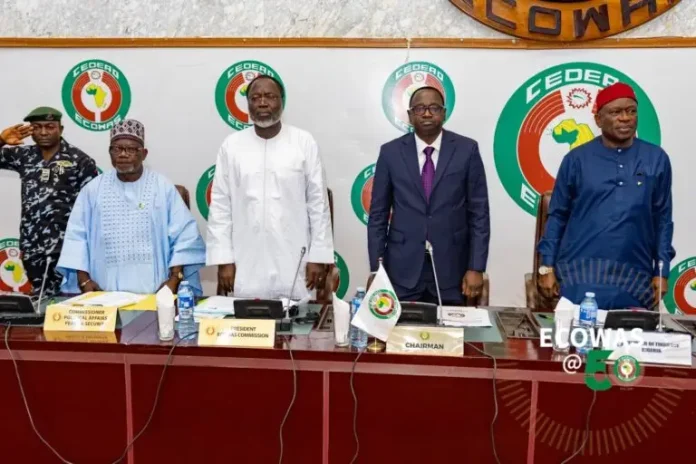News Investigators/ President of the ECOWAS Commission, Omar Touray, has said that the regional bloc requires approximately 2.61 billion dollars to operationalise its proposed 5,000-strong ECOWAS Standby Force (ESF).
Mr Touray disclosed this during a joint meeting of ECOWAS Ministers of Finance and Defence held on Friday in Abuja.
The News Agency of Nigeria (NAN) reports that the meeting aimed to finalise the modalities for mobilising funds to activate the regional anti-terrorism force.
The president noted that terrorism in any form remained a significant threat to regional integration, prompting ECOWAS leaders to prioritise the creation of a military response force.
“The emergence of terrorist group activities within and around West Africa has become a matter of serious concern to governments and citizens of the region,” Touray said.
He warned that such activities threatened international trade and investment, disrupted regional commerce, and restricted the free movement of people, goods, and services across West African borders.
Citing the Global Terrorism Index (GTI) 2025 report, Touray said Africa has now become the global epicentre of terrorism, displacing the Middle East as the most affected region.
He explained that the Sahel region, in particular, has seen a surge in terrorist operations, driven by political instability, weak governance, and prolonged conflicts.
“In response, ECOWAS has taken a multi-dimensional approach to counter-terrorism, including the development of a comprehensive strategy, establishment of a Standby Force, and regional collaboration on intelligence, training, and humanitarian interventions,” he said.
Mr Touray recalled that at a previous meeting held on June 27, 2024, in Abuja, the ministers had deliberated extensively on activating the standby force to combat both terrorism and unconstitutional changes of government in the region.
He described the creation of the 5,000-man force as a top priority, with the goal of restoring peace and stability wherever they was a threat in the ECOWAS sub-region.
Also speaking, Nigeria’s Minister of Defence, Mohammed Abubakar, emphasised that the region was facing growing threats including terrorism, violent extremism, transnational crime, and unconstitutional power grabs.
He said the Abuja meeting marked a critical step toward operationalising a regional counter-terrorism force that reflected a collective resolve to defend sovereignty, uphold constitutional order, and protect citizens.
“As we advance with these proposals, it is important to align our strategic objectives with predictable, sustainable, and transparent funding mechanisms,” Abubakar noted.
He listed potential funding options such as adjustments to the Community Levy, recovery of levy arrears, GDP-based contributions, direct budget allocations, blended financing, and targeted partnerships.
“This moment must be viewed not just as another meeting, but as a mandate to act decisively.
“The people of ECOWAS are counting on us, not only for protection but for leadership,” he added.
Sierra Leone’s Deputy Minister of Defence, retired Brima Massaquoi, highlighted ECOWAS’s broader role in economic integration, conflict resolution, governance, and human rights.
In spite of progress, he said, the region still faced significant challenges, including political instability, recurring conflicts, transnational crimes, humanitarian crises, and terrorism.
Rtd Col. Massaquoi stressed that effective counter-terrorism required strong leadership, coordination, and capacity-building to strengthen regional preparedness and response capabilities.
He urged the bloc to adopt inclusive and innovative financing models, including contributions from member states, partnerships with regional financial institutions, and the establishment of specialised regional security funds.
“We must also explore Public-Private Partnerships (PPPs) and invest in training, intelligence infrastructure, and coordination centres to maximise the impact of available resources,” Massaquoi added.
NAN


